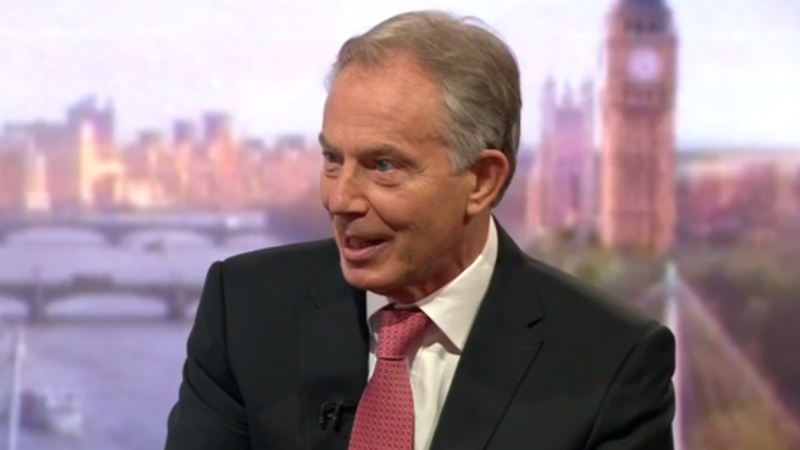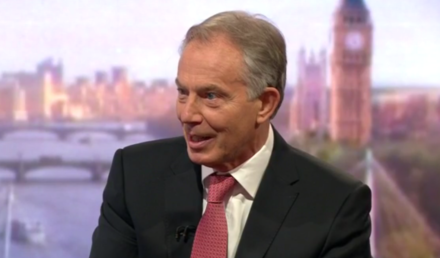

How do you cope with the presence of Labour’s most electorally successful leader and the man who delivered the minimum wage and peace in Northern Ireland?
It is a strange question and symptomatic of the altered times in which we live. But, as Tony Blair and much of the centre-left marked the 20th anniversary of his landslide general election victory, it is one that burns more brightly than for a long time.
Blair’s comeback is back. There have been several rumoured returns but yesterday, some two decades after he walked up the streets of Downing Street to cheering crowds – mainly Labour staffers – he finally confirmed his “direct motivation to get more involved in the politics” of Brexit. But he also wants to redraw his reputation after years of bashing from the likes of Jeremy Corbyn, over his politics, and the press, over his earnings.
The most memorable comment he delivered in his Mirror interview was, of course, the awareness that he could get a “bucket of wotsit” poured over him for making a direct intervention into British politics. What may have been more telling, however, was the other line he used when asked if public perception of him in 2017 meant he was really the best person to put forward his views – “Some people say it harms it and other people will say the opposite, and by the way, it’s more mixed than you might think.”
Blair is sick of being criticised when he won three elections easily and delivered immense social change. Even after the Iraq War, which he accepts will always affect his legacy in voters’ minds, he won a majority of 66, far greater than that achieved by David Cameron, the man who once claimed to be his “heir”.
Labour’s leaders have had uneasy relationships with Blair since the party left government. Ed Miliband wanted to reshape capitalism and move on from what he saw as a Blairism that was far too relaxed about inequality, and the role of big corporates in public life, while Corbyn has not been shy of giving his view of the former prime minister on issues ranging from Iraq to big business.
There are signs, however, that some in Labour are coming to terms with the presence of Blair.
Yesterday a member of Corbyn’s shadow cabinet published on LabourList a defence of Labour’s record in office – although there was no mention of the words “Tony” or “Blair” in the piece.
The article, by Andrew Gwynne, Labour’s national campaigns co-ordinator, began by pointing out that Labour “radically re-shaped Britain after 18 years of Tory failure” and “vastly improved the living standards of millions of families and created a fairer, more equal society”. Quite right.
Gwynne’s article did include a list of 50 key achievements of the Blair/Brown governments but you will notice that it is concentrated almost exclusively on key improvements in public services, or social and economic reforms that have been accepted by most elements of the party, and indeed by many Tories.
It was devoid of any mention of foreign affairs – but contrast that with the half-century table on Blair’s own website, which cites major military actions, such as “interventions to defend human rights and rule of law in Bosnia, Kosovo, East Timor and Sierra Leone”.
Blair’s successors at the top of the party are fighting a general election that few of us expected. Some in the shadow cabinet accept that Labour can only win again by defending its record with vigour. They know that the party’s past strategy, which looked like a distancing of itself from those 13 years in government, will not propel it back to power. A message of implying “vote Labour… even though it didn’t go that well last time” will not work.
Labour must accept the failures of its years in office, particularly the years of bloodshed in the aftermath of the Iraq invasion, but must also trumpet its many successes in areas like health, schools, social reform and the lives saved in places like Kosovo.
The Tories are not shy of shouting about what they see as the “achievements” of Thatcherism – even though we would recognise those reforms as bringing de-industrialistion, division and, in some cases, despair. So, even as we continue to debate New Labour, our party must learn to live with Tony Blair.




More from LabourList
‘The Sherriff of Wild Westminster: what must change in elections bill’
‘The hope that kills you’: Reflections from the final day in Gorton and Denton
MPs, union leaders and organisations react to ‘bruising’ Gorton and Denton result